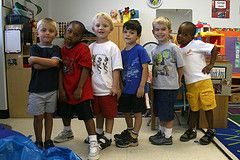Ten Secrets for a Happy Start to Preschool or Kindergarten
Even the most enthusiastic child can have worries about starting school.

Source: woodleywonderworks, creative commons via flickr
Ideas from Dona Matthews, PhD, and Joanne Foster, EdD, for parents who want to help make the transition to school go as well as possible for their young child:
- Nurturing. Your child will need more snuggles and reassurance than usual, especially in the first few weeks of any transition time. Providing hugs and attention as needed is a great investment in things going well.
- He-talks-and-you-listen times. Try to listen receptively to your child always, but as school begins, set aside special times for this purpose. It might only be for a few minutes two or three times a day, but during those special times, listen with your whole heart and mind.
- Attention to friendship-building and social intelligence. Some preschoolers need help learning to manage the social demands of the classroom. Talk to your child about how friendships develop—with time, sharing, openness, and kindness.
- Books and videos. Back-to-school books and videos feature Curious George, the Berenstain Bears, Sesame Street characters, Maisie, and more. Read or watch together, letting your child encounter others’ adventures, challenges, and solutions.
- Playschool. Provide paper, crayons, and other supplies that allow your child to invent school-like activities, both on her own and with others. You might offer to play the role of the teacher or a child, or perhaps the principal or custodian.
- Unstructured outdoor play. For the best development of their imagination, confidence, and independence, kids need more unstructured outdoor play than they usually get at school. Be sure to provide this as often as possible.
- Extracurricular activities. After school and weekends are good times for enrichment activities. Possibilities include music, sports, second-language learning, drama, nature walks, museum visits, and lots more. Keep in mind, though, that while opportunities and choice are great, over-programming is not.
- Rest and relaxation. Even if it looks like she’s having fun all day long, your child is actually working hard on the social, emotional, physical, and academic demands of school. He needs a balance in his life between activities and quiet times in order to recharge his batteries and process what he’s learning.
- Bedtime rituals. A child of five or six is not too old for a bedtime story and a lullabye as part of the end of day routine. This provides a chance for you to talk about the day, listen to what’s on your child’s mind, help her process ideas, and provide whatever she may need by way of calming, soothing, and reassurance.
- Advocacy. If you have concerns about what’s happening at school, you can meet with the teacher. Try to listen receptively and think about your role in solving any problems, seeing it as a working partnership with the school—perhaps the first of many you’ll be establishing over the years.
For more information:
Beyond Intelligence, Secrets for Raising Happily Productive Kids, by Dona Matthews and Joanne Foster (House of Anansi, 2014).
'Back-to-School Worries,' by Eileen Kennedy-Moore
'Three Ways to Boost Your Child's Confidence for the New School Year,' by Ariadne Brill
'Back-to-School Sleep Prep 101,' by Alanna McGinn
'Back-to-School Jitters: 5 Ways to Calm Your Child’s Nerves,' by Alyson Shafer
'OT Tips for Getting Your Child JK Ready,' by Jordana Schwarz

No comments:
Post a Comment